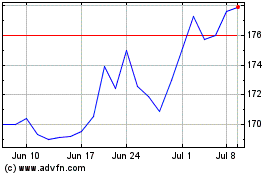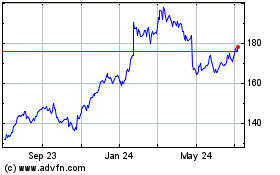By Heidi Vogt
WASHINGTON -- Technology companies are racing to get ahead of
regulators to shape the future of artificial intelligence as it
moves deeper into our daily lives.
Companies are already working artificial intelligence, or AI,
into their business models, but the technology remains
controversial. So IBM Corp., Intel Corp. and associations
representing Apple Inc., Facebook Inc. and Alphabet Inc.'s Google
unit are seeking to set ethical standards, or a sort of code of
conduct, through alliances with futurists, civil-rights activists
and social scientists.
Critics, however, see it as an effort to blunt outside
regulation by cities, states or the federal government, and they
question if tech companies are best suited to shape the rules of
the road. For the corporations, the algorithms will be proprietary
tools to assess your loan-worthiness, your job application, and
your risk of stroke. Many balk at the costs of developing systems
that not only learn to make decisions, but that also explain those
decisions to outsiders.
When New York City proposed a law in August requiring that
companies publish source code for algorithms used by city agencies,
tech firms pushed back, saying they needed to protect proprietary
algorithms. The city passed a scaled-back version in December
without the source-code requirement.
"They're hiding behind trade secrets so you can't even get a
look at what people are doing," said Ryan Calo, a University of
Washington law professor who has advised Congress members on AI
issues.
AI, broadly speaking, refers to computers mimicking intelligent
behavior, crunching big data to make judgments on anything from
avoiding car accidents to where the next crime might happen.
Yet computer algorithms aren't always clear on their logic. If a
computer consistently denies a loan to members of a certain sex or
race, is that discrimination? Will regulators have the right to
examine the algorithm that made the decision? What if the algorithm
doesn't know how to explain itself?
The Obama administration sought to address these issues. Under
Mr. Obama, the Office of Science and Technology Policy issued white
papers on the ethical implications on AI. Under Mr. Trump, the
office still doesn't have a director, and its staff is down to
about 45, from about 130. A spokesman for the office declined to
comment.
For now, the Trump administration has signaled it wants business
take the lead. The administration is worried overarching regulation
could constrain innovation and make the U.S. less competitive,
Michael Kratsios, the deputy director of the Office of Science and
Technology Policy, said at a conference in February. He noted
China's push into artificial intelligence, which it is doing
without much ethical quibbling.
"We're not looking for, or will be endorsing, broad, high level
guidelines about AI rules," Mr. Kratsios said. He called it "key"
to create "the regulatory environment that ensures that the next
great technologies happen here in the U.S."
In the past six months, Intel, IBM, Workday Inc. and the
Washington, D.C.-based Information Technology Industry Council --
whose members include Facebook, Apple and Google -- all issued
principles on the ethical use of artificial intelligence. In
January, Microsoft Corp. put out an entire book on "Artificial
Intelligence and its Role in Society."
In 2016, some of the biggest tech companies founded an
ethics-setting organization called the Partnership on Artificial
Intelligence to Benefit People and Society, based in San Francisco.
There are many others with at least some industry funding,
including Open AI, the AI Now Institute, doteveryone, and the
Center for Democracy & Technology.
Proposed rules have ranged from specific guidelines for
government use, to requirements that any algorithm be able to
explain its process to consumers. Many would apply existing
regulations to AI case-by-case, adapting aviation rules to drones
or applying privacy protections to personal data in algorithms.
Setting rules is complicated because companies often can't
explain how their more complex systems, called "deep neural
networks," arrive at answers. Last year, University of Washington
researchers reported that an algorithm that had learned -- by
itself -- to distinguish between wolves and husky dogs appeared to
be doing so by noticing snow on the ground in the wolf pictures,
not because of any insight into the animal.
"Google, Facebook, those guys are very interested in performance
and making these programs as smart as they can," said Dave Gunning,
who leads a project into making algorithms explain their processes
for the government's Defense Advanced Research Projects Agency.
"Explainability is not as important to them," Mr. Gunning said.
Google and Facebook didn't respond to requests for comment.
At least one business executive, Elon Musk, founder and chief
executive of Tesla Inc. and SpaceX, has cut back his role in the
ethical research group he co-founded, Open AI. Mr. Musk quit the
group's board in February. The group said he wanted to "eliminate a
potential future conflict of interest" with his role at Tesla,
which is developing AI systems. He remains an Open AI adviser and
funder.
Some in Congress are taking up the ethical debate. Washington
Sen. Maria Cantwell and Maryland Rep. John Delaney, both Democrats,
led a bipartisan bill introduced in December to establish a federal
advisory council on the technology's potential impact. There is
also an AI caucus on the Hill, started in may, and committees have
been holding hearings on AI, algorithms and autonomous vehicles.
The European Union has already set regulations for AI algorithms,
that are set to take effect in May.
Human-resources software maker Workday, which uses Ai
algorithms, assumes that either now, or sometime soon, the U.S.
will start to set guidelines.
"Our engagement now is in anticipation that one day there will
be government regulation related to AI," said senior vice president
Jim Shaughnessy. He said Workday wants to "ensure a regulatory
framework that serves society's needs while allowing the potential
of AI, and its benefits, to flourish."
(END) Dow Jones Newswires
March 13, 2018 05:44 ET (09:44 GMT)
Copyright (c) 2018 Dow Jones & Company, Inc.
International Business M... (NYSE:IBM)
Historical Stock Chart
From Mar 2024 to Apr 2024

International Business M... (NYSE:IBM)
Historical Stock Chart
From Apr 2023 to Apr 2024
